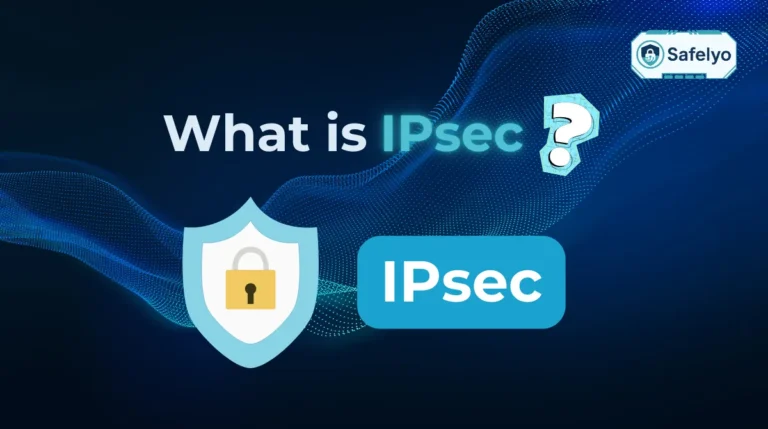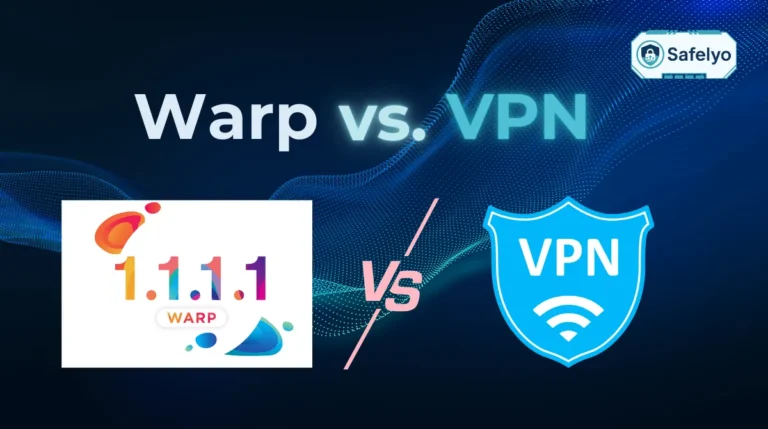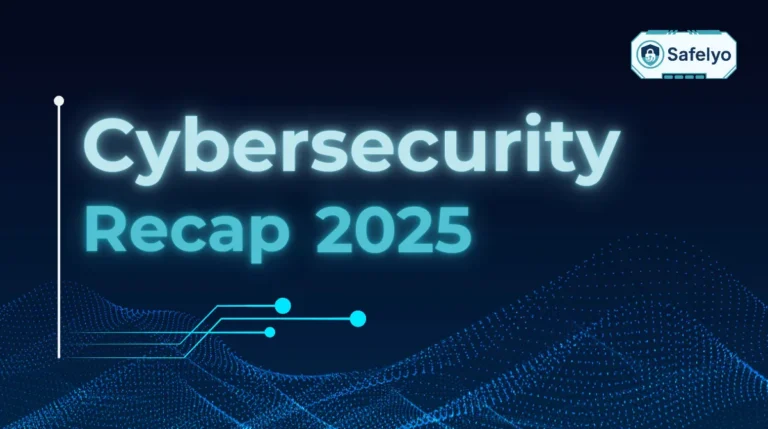Is there a free VPN? Yes, several providers offer free versions that let you encrypt your traffic and hide your IP address without paying. But these options often come with limits on data, speed, or server locations.
Imagine connecting to a café’s public Wi-Fi while testing a free VPN app. The protection feels reassuring, yet you quickly notice slower speeds or a “data limit reached” message. This trade-off defines most free VPN experiences: basic security for light use, not full-time privacy.
Key takeaways:
- Free VPNs exist, but most restrict data usage, connection speeds, or server locations.
- Some “free forever” services fund themselves with ads or data collection.
- Reliable free options like Proton VPN prioritize encryption and a clear no-logs policy.
- Switching to paid plans unlocks faster, safer, and more consistent protection.
1. Quick answer: Is there a free VPN?
Yes, there are several free VPNs, but each comes with trade-offs. A trustworthy free VPN can secure your internet connection and conceal your IP address. However, it usually limits your bandwidth, server selection, or connection speed to manage costs and prevent heavy usage.
Most providers treat their free tier as a way to demonstrate core features before you upgrade. You’ll still get encrypted traffic and basic online safety, but performance and privacy policies vary widely between brands.
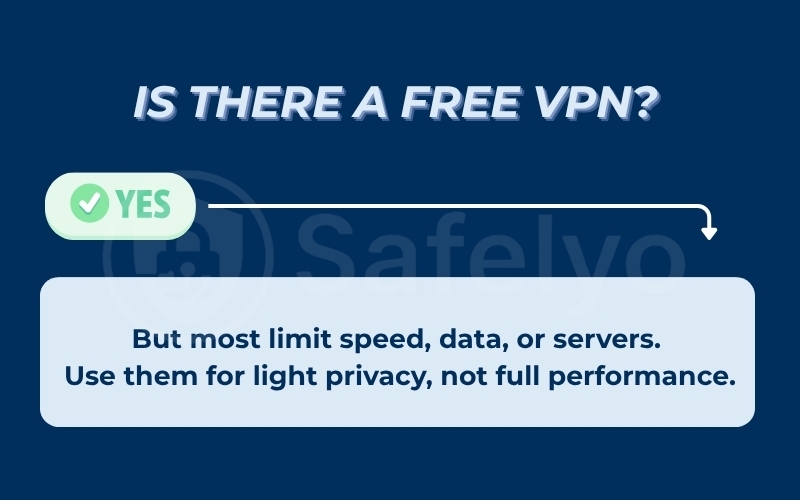
In short, free VPNs exist, but finding one that balances privacy, usability, and reliability takes careful comparison.
2. How free VPNs actually work
Free VPNs rely on limited resources and specific business models to stay operational. Understanding how they function helps you decide which options are worth your trust and which may put your privacy at risk.
2.1. What makes a VPN “free” in the first place?
A “free VPN” usually operates on a freemium structure. That means the provider offers basic access at no cost while reserving premium features for paying users. Common limitations include:
- A small number of server locations
- Monthly or daily data caps
- Restricted P2P traffic or blocked streaming
- In-app ads that help offset server costs
These limits exist to reduce bandwidth usage and encourage upgrades to paid plans. From a technical point of view, free users often share congested servers, which leads to slower connection speeds during peak times.
2.2. How providers make money without charging users
Even if a VPN is free, it still incurs hosting, maintenance, and customer support costs. Providers use several monetization methods to cover these expenses, such as:
- Upselling paid tiers: Free access acts as a sample for premium plans with more servers, faster speeds, and simultaneous connections.
- Ad-supported models: Some providers display in-app ads or partner with third parties to show sponsored content.
- Collecting limited usage data: A few track non-identifiable metrics like connection timestamps or bandwidth totals for performance monitoring.
The key is transparency. A reputable provider clearly explains how it handles user data and whether advertising networks have access to it.
2.3. Why some “free forever” VPNs may compromise privacy
The phrase “free forever” can sound appealing, but it often hides a less transparent revenue source. Some VPNs have been caught injecting ads, installing trackers, or even selling user data to third parties. These practices undermine the very privacy they claim to protect.
Before installing any VPN, review its logging policy and check for independent audits or security disclosures. Services that operate under strong privacy laws and publish clear no-logs statements are far safer than those with vague or missing documentation.
3. Are free VPNs safe to use
Whether a free VPN is safe depends on how it handles your privacy, encryption standards, and data collection practices. Some providers are transparent and secure, while others may expose your information through weak settings or hidden tracking.
3.1. Signs of a trustworthy free VPN
A reliable free VPN shows clear ownership, transparent policies, and proven security measures. Look for these signs before downloading:
- A public and independently verified no-logs policy
- Strong encryption protocols such as OpenVPN or WireGuard
- Clear details on what data is collected and why
- Availability of third-party audits or open-source clients
- Consistent updates and responsive customer support
Providers like Proton VPN, Hide.me, or Windscribe meet most of these standards by prioritizing transparency and modern encryption.
3.2. Red flags to avoid when choosing a free VPN
Not every free VPN is safe. Be cautious of apps that show poor transparency or overly broad permissions. Avoid services that:
- Lack an official website or company information
- Request excessive mobile permissions (contacts, storage, or SMS)
- Use outdated encryption or weak security protocols
- Have a history of malware or leaked user data
- Promise unlimited data with no clear funding model
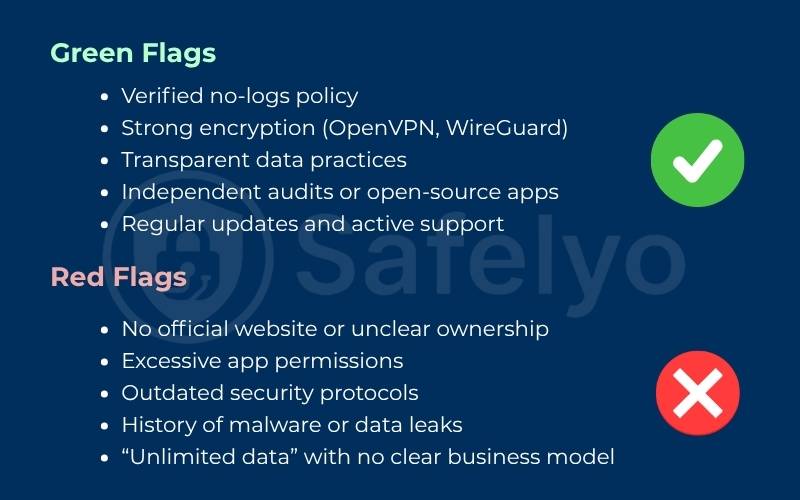
These warning signs often point to data harvesting or ad injection, which can put your privacy at risk.
3.3. When using a free VPN makes sense
Free VPNs can still be useful in certain situations if you understand their limits. They work well for occasional browsing, testing a service before subscribing, or connecting safely to public Wi-Fi.
If your goal is casual protection rather than constant streaming or file sharing, a free VPN is often enough. For instance, many travelers use Proton VPN’s free version to secure hotel or airport Wi-Fi.
In short, free VPNs are best for light, temporary use when performance and flexibility are less important than basic encryption and privacy.
4. Which free VPNs are worth trying
If you only need basic protection or want to test before subscribing, several free VPNs offer a secure experience with reasonable limits. Each one has a slightly different balance between speed, data allowance, and privacy controls.
- Proton VPN: Offers unlimited data on the free plan but limits you to a few server locations. It uses strong encryption and has a verified no-logs policy.
- PrivadoVPN: Includes 10 GB of free data per month and access to a few global servers. It provides stable speeds for browsing and lightweight streaming.
- Windscribe: Gives up to 10 GB monthly data if you verify your email. It features built-in ad and tracker blocking, plus support for split tunneling on desktop.
- Hide.me: Known for strong protocol support and a transparent privacy policy. The free plan offers multiple server choices and no ads.
- TunnelBear: Designed for beginners with an easy interface and consistent updates. Its main limitation is a 2GB monthly data cap, which can increase with promotions.
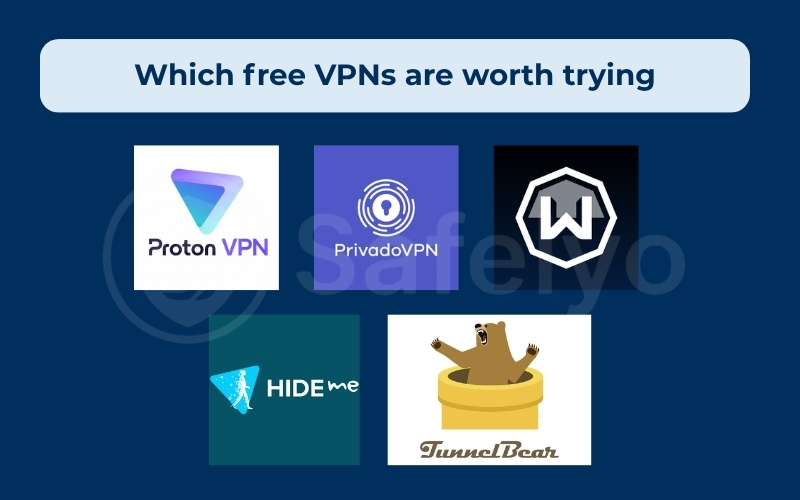
For in-depth comparisons, performance tests, and privacy evaluations, see our full guide: Best Free VPNs.
5. What free VPNs usually can’t do
Free VPNs provide a useful layer of protection, but they are rarely suitable for heavy or advanced use. Their technical and business limitations make them less effective for tasks that demand high speed, reliability, or full access to online services.
Most free VPNs:
- Struggle with streaming services such as Netflix or Hulu because these platforms block known free VPN servers.
- Slow down during peak hours due to limited bandwidth and shared infrastructure.
- Lack router and console support, which means you can’t easily protect all your devices at once.
- Do not include premium features like dedicated IPs, advanced split tunneling, or 24/7 customer support.
These restrictions make free VPNs suitable for light browsing or privacy protection on public Wi-Fi, but not for gaming, torrenting, or daily remote work.
Read more:
6. Is there any free VPN with unlimited data?
A few free VPNs offer unlimited data, but they often limit other features such as server locations, connection speeds, or available countries. The goal is to give users basic access while keeping server costs sustainable.
Proton VPN is one of the most trusted examples. Its free plan provides unlimited data usage without ads or time limits, but it restricts you to specific servers and moderate speeds during busy periods. This makes it ideal for browsing and email use, but not for high-bandwidth activities like streaming or large downloads.
Another key example is Hide.me, which also provides unlimited data on its free plan without ads. The trade-off is similar, limiting free users to 1 connection and 8 specific server locations.
Other free VPNs may advertise “no data limits,” yet impose hidden caps or throttle connections when usage becomes heavy. Always read the provider’s terms to confirm what “unlimited” really means.
In practice, unlimited data on a free plan usually comes with trade-offs in performance or server access. For users who need consistent speed and flexibility, upgrading to a paid tier is often more practical.
7. When it’s time to switch to a paid VPN
Free VPNs are helpful for light browsing, but there are clear signs it’s time to move to a paid plan. The main differences appear in speed, consistency, and privacy control.
7.1. Situations where free VPNs fall short
You should consider upgrading if you:
- Stream content regularly, since most free VPNs cannot bypass geo-restrictions on Netflix or other platforms.
- Use P2P traffic or torrenting, which many free services block entirely.
- Work remotely with sensitive data, where reliability and uptime are essential.
- Connect multiple devices, because free tiers often limit simultaneous connections.
- Need fast, stable performance without constant reconnections or throttling.
These scenarios require the higher bandwidth, broader server network, and stronger customer support that paid VPNs provide.
7.2. What you gain by upgrading
A paid VPN offers better performance, stronger privacy tools, and more control over your connection. Benefits include:
- Access to faster servers across more countries
- Stable connections for streaming and file sharing
- Advanced encryption options and leak protection
- Priority customer support when problems occur
- Additional features like dedicated IPs or router integration
These upgrades improve both security and usability for anyone relying on VPNs daily.
7.3. Affordable upgrade tips for beginners
Moving to a paid VPN doesn’t have to be expensive. You can:
- Start with a free trial or short-term plan to test performance.
- Watch for bundle or seasonal discounts, especially around major sales events.
- Use student or referral programs for extra savings.
- Compare multi-month plans, which usually lower the average monthly cost.
By upgrading smartly, you get premium-level privacy and faster connections while keeping costs manageable.
8. FAQs about “Is there a free VPN”
These common questions help clarify what you can realistically expect from free VPN services and how to use them safely.
Are free VPNs legal everywhere?
Free VPNs are legal in most countries, but some regions regulate or restrict their use. Always check local laws before installing or using one, especially if you plan to connect through international servers.
Can a free VPN hide my real IP address?
Yes, a free VPN can mask your IP address by routing traffic through its servers. However, leaks can still occur if the VPN lacks a kill switch or DNS protection. Always verify these settings inside the app.
Do free VPNs log or sell your data?
Some free VPNs collect limited usage data for analytics, while others may sell information to advertisers. Look for providers that publish an independent no-logs audit and clearly state what data they store.
Can I stream Netflix or YouTube with a free VPN?
Free VPNs usually allow YouTube, but Netflix and major streaming services block most free IP addresses. For consistent access, a paid plan with dedicated streaming servers is required.
Is a free VPN safe for public Wi-Fi use?
Yes, using a free VPN is safer than no protection when connecting to public Wi-Fi. Still, avoid online banking or sharing personal data because not all free VPNs use advanced encryption.
Which free VPN is safest for Android and iPhone?
Proton VPN, Hide.me, and Windscribe are among the safest choices for mobile devices. They receive frequent updates, use modern protocols, and publish transparent privacy policies that detail how user data is handled.
9. Conclusion
Free VPNs can provide a quick and simple way to improve online privacy, but they are not designed for long-term or intensive use. The main limits often involve data caps, speed restrictions, and reduced access to global servers.
When someone asks “Is there a free VPN?”, the honest answer is yes, but with clear trade-offs. These tools are useful for casual browsing, travel Wi-Fi, or testing features before upgrading. For consistent streaming, file sharing, or remote work, paid VPNs deliver the stability and privacy protection free ones cannot.
In my own tests, I used Proton VPN’s free plan during a business trip to secure airport Wi-Fi. It worked well for light browsing but slowed noticeably during peak hours, reminding me that free VPNs prioritize accessibility over performance.
For more practical guides on protecting your digital life, explore the Privacy & Security Basics section at Safelyo.


